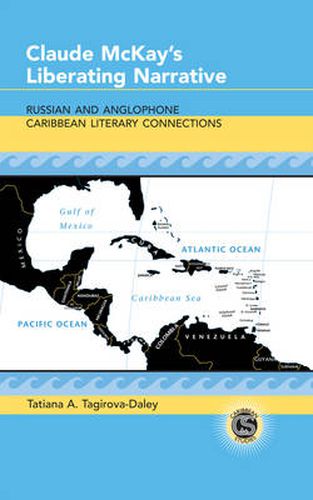Readings Newsletter
Become a Readings Member to make your shopping experience even easier.
Sign in or sign up for free!
You’re not far away from qualifying for FREE standard shipping within Australia
You’ve qualified for FREE standard shipping within Australia
The cart is loading…






This title is printed to order. This book may have been self-published. If so, we cannot guarantee the quality of the content. In the main most books will have gone through the editing process however some may not. We therefore suggest that you be aware of this before ordering this book. If in doubt check either the author or publisher’s details as we are unable to accept any returns unless they are faulty. Please contact us if you have any questions.
Claude McKay’s Liberating Narrative: Russian and Anglophone Caribbean Literary Connections examines McKay’s search for an original form of literary expression that started in Jamaica and continued in his subsequent travels abroad. Newly found research pertaining to his presence in several Russian periodicals, magazines, and literary diaries brings new light to the writer’s contribution to the Soviet understanding of African American and Caribbean issues and his possible influence on Yevgeny Zamyatin, the writer he met during his 1922 - 1923 visit to Russia. The primary focus of this book is Claude McKay and his positive reception of Alexander Pushkin, Feodor Dostoyevsky, and Leo Tolstoy, the nineteenth-century Russian writers who influenced his literary career and enabled him to find a solution to his dilemma of a dual Caribbean identity. The secondary focus of this book is the analysis of McKay’s affinity with his Russian literary predecessors and with C.L.R. James and Ralph de Boissiere, his Trinidadian contemporaries, who also acknowledged the importance of Russian writers in their artistic development. The book discusses McKay as a precursor of Russian and Anglophone Caribbean links and presents a comparative analysis of cross-racial, cross-national, and cross-cultural alliances between these two distinct yet similar types of literature. Claude McKay’s Liberating Narrative is highly recommended for undergraduate and graduate courses in Caribbean and comparative literature at North American, European, Caribbean, and African universities.
$9.00 standard shipping within Australia
FREE standard shipping within Australia for orders over $100.00
Express & International shipping calculated at checkout
This title is printed to order. This book may have been self-published. If so, we cannot guarantee the quality of the content. In the main most books will have gone through the editing process however some may not. We therefore suggest that you be aware of this before ordering this book. If in doubt check either the author or publisher’s details as we are unable to accept any returns unless they are faulty. Please contact us if you have any questions.
Claude McKay’s Liberating Narrative: Russian and Anglophone Caribbean Literary Connections examines McKay’s search for an original form of literary expression that started in Jamaica and continued in his subsequent travels abroad. Newly found research pertaining to his presence in several Russian periodicals, magazines, and literary diaries brings new light to the writer’s contribution to the Soviet understanding of African American and Caribbean issues and his possible influence on Yevgeny Zamyatin, the writer he met during his 1922 - 1923 visit to Russia. The primary focus of this book is Claude McKay and his positive reception of Alexander Pushkin, Feodor Dostoyevsky, and Leo Tolstoy, the nineteenth-century Russian writers who influenced his literary career and enabled him to find a solution to his dilemma of a dual Caribbean identity. The secondary focus of this book is the analysis of McKay’s affinity with his Russian literary predecessors and with C.L.R. James and Ralph de Boissiere, his Trinidadian contemporaries, who also acknowledged the importance of Russian writers in their artistic development. The book discusses McKay as a precursor of Russian and Anglophone Caribbean links and presents a comparative analysis of cross-racial, cross-national, and cross-cultural alliances between these two distinct yet similar types of literature. Claude McKay’s Liberating Narrative is highly recommended for undergraduate and graduate courses in Caribbean and comparative literature at North American, European, Caribbean, and African universities.